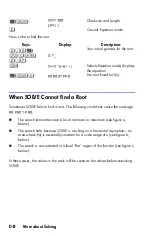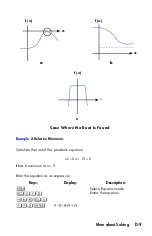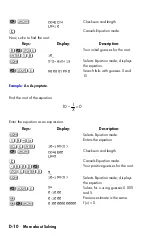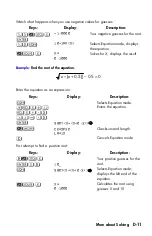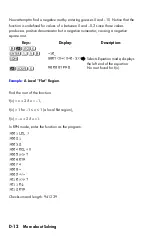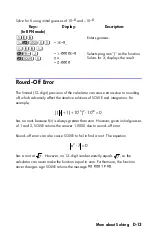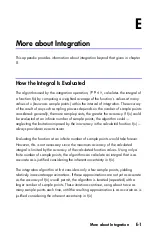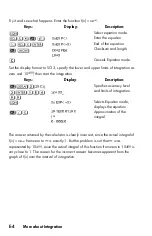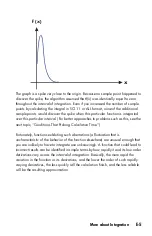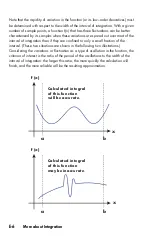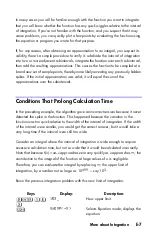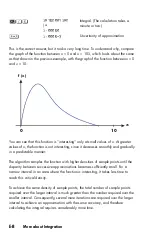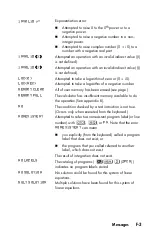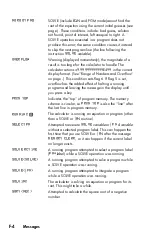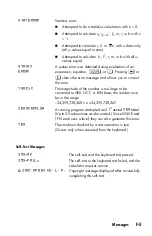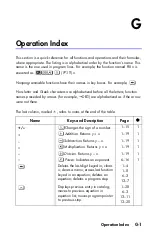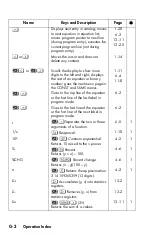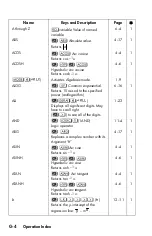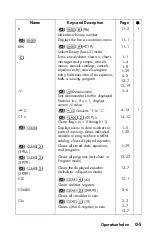
E-7
In many cases you will be familiar enough with the function you want to integrate
that you will know whether the function has any quick wiggles relative to the interval
of integration. If you're not familiar with the function, and you suspect that it may
cause problems, you can quickly plot a few points by evaluating the function using
the equation or program you wrote for that purpose.
If, for any reason, after obtaining an approximation to an integral, you suspect its
validity, there's a simple procedure to verify it: subdivide the interval of integration
into two or more adjacent subintervals, integrate the function over each subinterval,
then add the resulting approximations. This causes the function to be sampled at a
brand new set of sample points, thereby more likely revealing any previously hidden
spikes. If the initial approximation was valid, it will equal the sum of the
approximations over the subintervals.
Conditions That Prolong Calculation Time
In the preceding example, the algorithm gave an incorrect answer because it never
detected the spike in the function. This happened because the variation in the
function was too quick relative to the width of the interval of integration. If the width
of the interval were smaller, you would get the correct answer; but it would take a
very long time if the interval were still too wide.
Consider an integral where the interval of integration is wide enough to require
excessive calculation time, but not so wide that it would be calculated incorrectly.
Note that because
f(x)
= xe
–
x
approaches zero very quickly as
x
approaches
∞
, the
contribution to the integral of the function at large values of
x
is negligible.
Therefore, you can evaluate the integral by replacing
∞
, the upper limit of
integration, by a number not so large as 10
499
— say 10
3
.
Rerun the previous integration problem with this new limit of integration:
Keys:
Display:
Description:
_
New upper limit.
Selects Equation mode; displays the
equation.
Summary of Contents for 35s
Page 1: ...HP 35s scientific calculator user s guide H Edition 1 HP part number F2215AA 90001 ...
Page 14: ...12 Contents ...
Page 15: ...Part 1 Basic Operation ...
Page 16: ......
Page 46: ...1 30 Getting Started ...
Page 63: ...RPN The Automatic Memory Stack 2 17 A Solution ...
Page 64: ...2 18 RPN The Automatic Memory Stack ...
Page 74: ...3 10 Storing Data into Variables ...
Page 180: ...12 14 Statistical Operations ...
Page 181: ...Part 2 Programming ...
Page 182: ......
Page 246: ...15 12 Solving and Integrating Programs ...
Page 270: ...16 24 Statistics Programs ...
Page 284: ...17 14 Miscellaneous Programs and Equations ...
Page 285: ...Part 3 Appendixes and Reference ...
Page 286: ......
Page 308: ...B 8 User Memory and the Stack ...
Page 322: ...C 14 ALG Summary ...
Page 336: ...D 14 More about Solving ...
Page 346: ...E 10 More about Integration ...
Page 352: ...F 6 Messages ...
Page 370: ...G 18 Operation Index ...
Page 382: ...Index 12 ...


